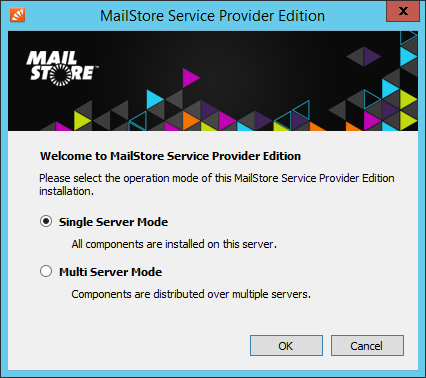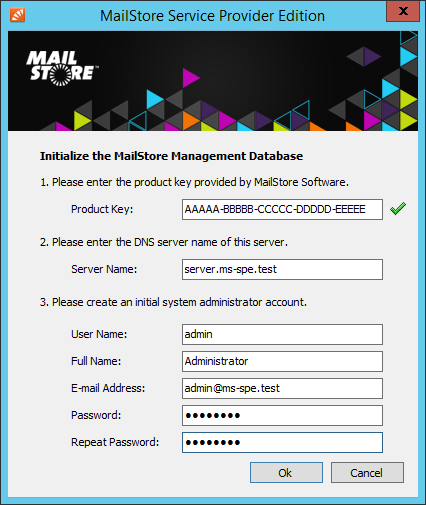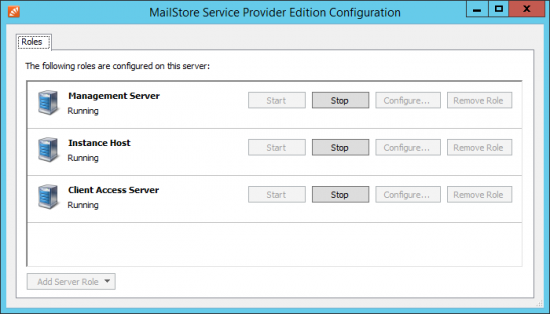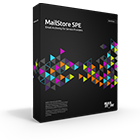Difference between revisions of "Single Server Mode Setup"
| [unchecked revision] | [unchecked revision] |
| Line 1: | Line 1: | ||
__NOTOC__ | __NOTOC__ | ||
| − | + | = Set Up Single Server Mode = | |
* If not executed automatically by the installation program, start the MailStore Service Provider Edition Configuration tool by double-clicking its desktop icon. On a Windows Server Core use the command line prompt to start the executable (default: <tt>%PROGRAMFILES%\MailStore Infrastructure\MailStoreInfrastructureConfig.exe</tt>. | * If not executed automatically by the installation program, start the MailStore Service Provider Edition Configuration tool by double-clicking its desktop icon. On a Windows Server Core use the command line prompt to start the executable (default: <tt>%PROGRAMFILES%\MailStore Infrastructure\MailStoreInfrastructureConfig.exe</tt>. | ||
| Line 12: | Line 12: | ||
* The startup process of the services takes place in the background. Therefore a service shown as ''running'' may still revert to ''stopped'' during a period of about 30 seconds in the event of an error. | * The startup process of the services takes place in the background. Therefore a service shown as ''running'' may still revert to ''stopped'' during a period of about 30 seconds in the event of an error. | ||
| − | + | = What to do next = | |
In production environments it is recommended to replace the self-signed certificates used by the Client Access Server's IMAP and HTTP server with certificates signed by a trusted root certificate authority. Further details can be found in [[Replace Self-signed SSL Certificates]] | In production environments it is recommended to replace the self-signed certificates used by the Client Access Server's IMAP and HTTP server with certificates signed by a trusted root certificate authority. Further details can be found in [[Replace Self-signed SSL Certificates]] | ||
If the self-signed certificates should remain, the basic configuration of the MailStore Service Provider Edition is finished. All other administrative tasks are performed through the web-based [[Management_Console_-_General|MailStore Management Console]]. | If the self-signed certificates should remain, the basic configuration of the MailStore Service Provider Edition is finished. All other administrative tasks are performed through the web-based [[Management_Console_-_General|MailStore Management Console]]. | ||
Revision as of 09:23, 14 February 2014
Set Up Single Server Mode
- If not executed automatically by the installation program, start the MailStore Service Provider Edition Configuration tool by double-clicking its desktop icon. On a Windows Server Core use the command line prompt to start the executable (default: %PROGRAMFILES%\MailStore Infrastructure\MailStoreInfrastructureConfig.exe.
- If no configuration files and services are found, the MailStore Service Provider Edition Configuration tool will ask for the desired mode. Select Single Server Mode and click OK.
- Enter your product key into the Product Key field and change Server Name to the fully qualified host name of the server (e.g. server.ms-spe.test). Finally enter and confirm the admin password that will be used to log on to the Management Console.
- Click OK.
- The MailStore Service Provider Edition Configuration tool will now create the configuration files for the Management Server, Instance Host and Client Access Server roles. After the configuration has been successfully created, a Windows service is registered and started for each role. It takes about 10-15 seconds until the roles show up in the MailStore Service Provider Edition Configuration tool.
Important notice: Unless a different target directory was specified during installation, the configuration files are stored in %PROGRAMFILES%\MailStore Infrastructure\config. Although these files are in text format (JSON), please do not attempt to modify any of these files without using the MailStore Service Provider Edition Configuration tool. - The startup process of the services takes place in the background. Therefore a service shown as running may still revert to stopped during a period of about 30 seconds in the event of an error.
What to do next
In production environments it is recommended to replace the self-signed certificates used by the Client Access Server's IMAP and HTTP server with certificates signed by a trusted root certificate authority. Further details can be found in Replace Self-signed SSL Certificates
If the self-signed certificates should remain, the basic configuration of the MailStore Service Provider Edition is finished. All other administrative tasks are performed through the web-based MailStore Management Console.



